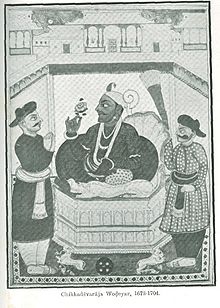Chikka Devaraja
| Chikka Devaraja | |
|---|---|
| Wodeyar of Mysore | |
 |
|
| Reign | 1673–1704 |
| Predecessor | Dodda Devaraja |
| Successor | Kanthirava Narasaraja II |
| Born | 22 September 1645 |
| Died | 16 November 1704 |
| House | Wodeyar |
Chikka Deva Raja (also Chikka Deva Raja Wodeyar) was the wodeyar ruler of Mysore (then a principality or petty kingdom in southern India) from 1673 to 1704. During this time, Mysore saw significant expansion and also recognition by the Mughal empire as a tributary state. During his rule centralized military power increased to an unprecedented degree for the region.
Chikka Devaraja was born on 22 September 1645, the eldest son of Rani Amrit Ammani and Dodda Deva Raja, who had been a Governor of Mysore town. He succeeded his uncle, Dodda Deva Raja, upon the latter's death on 11 February 1673, as the new wodeyar. He was installed on the gaddi at Mysore on 28 February 1673. He continued his predecessor's expansion by conquering Maddagiri, and thereby making Mysore contiguous to the Carnatic-Bijapur-Balaghat province administered by Venkoji, the Raja of Tanjore, and Shivaji's half-brother.
In the first decade of his rule, Chikka Devaraja introduced various petty taxes that were mandatory for the peasants, but that his soldiers were exempted from. The unusually high taxes and the intrusive nature of his regime, created wide protests in the ryots which had the support of the Jangama priests in the Virasaiva monasteries. According to (Nagaraj 2003), a slogan of the protests was:
"Basavanna the Bull tills the forest land; Devendra [Indra] gives the rains;
Why should we, the ones who grow crops through hard labor, pay taxes to the king?"
As per the unverified sources, the king, resolving upon a "treacherous massacre," used the stratagem of inviting over 400 priests to a grand feast at the famous Shaivite center of Nanjanagudu, and upon its conclusion having them first receive gifts and then exit one at a time through a narrow lane, whereupon his royal wrestlers strangled each exiting priest. This "sanguinary measure" had the effect of stopping all protests to the new taxes. Around this time, 1687, Chikka Devaraja also made an agreement with Venkoji to purchase Bengaluru (which later became Bangalore city and Bangalore Rural district) for Rs. 3 lakhs.
...
Wikipedia
